- Home
- Emma Chase
Royally Yours
Royally Yours Read online
Royally Yours, Copyright © 2018 by Emma Chase
All rights reserved.
No part of this publication may be reproduced, distributed, or transmitted in any form or by any means, including photocopying, recording, or other electronic or mechanical methods, without the prior written permission of the publisher, except in the case of brief quotations embodied in critical reviews and certain other noncommercial uses permitted by copyright law.
This book is a work of fiction. All names, characters, locations, and incidents are products of the author’s imagination. Any resemblance to actual persons, living or dead, locales, or events is entirely coincidental.
…
Cover Design: By Hang Le
Interior Book Design: JT formatting
Photographer: Rafael Catala
Cover model: Fabian Castro
ISBN: 978-0997426298
Table of Contents
Title Page
Prologue
Chapter One
Chapter Two
Chapter Three
Chapter Four
Chapter Five
Chapter Six
Chapter Seven
Chapter Eight
Chapter Nine
Chapter Ten
Chapter Eleven
Chapter Twelve
Chapter Thirteen
Chapter Fourteen
Chapter Fifteen
Chapter Sixteen
Chapter Seventeen
Chapter Eighteen
Chapter Nineteen
Chapter Twenty
Epilogue
A Preview of Getting Schooled
About the Author
Also by Emma Chase
NO WOMAN IS BORN A QUEEN, no matter the title attached to her name at birth.
Kings are crowned. But queens . . . queens rise.
They lift themselves from the depths of tragedy and heartbreak that always seem to follow them. They break the chains of society, and they soar through their triumphs and joys. They are forged by the burn of betrayal and they are shaped by the constant, cold clash of wills.
Still they rise, and then . . . they reign.
For good or bad, in sickness and in health, until death do they part.
The vestiges of that reign are the true inheritance of the descendants. For most, that birthright is duty, tradition and loyalty.
But the two of us were different. Right from the start, and in every way.
Passion that could tear the whole world down around us. Love that would not be ignored or denied. Devotion that would last beyond a lifetime.
These would be our legacy—our gifts to the ones who would follow in our footsteps. It would be scored on their bones and branded on their souls.
We just didn’t know it then.
Every dynasty has a beginning. Every legend starts with a story.
This is ours.
Averdeen, 1945
“YOU SHOULD HAVE SEEN HER, Alfie. She was so damn impressive. More dignified than any of those bawbags in Parliament could dream of being.”
My father, Reginald William Constantine Pembrook, the King of Wessco, often talks about me like I’m not in the room. My mother calls it a sorry habit. But I don’t mind, especially when he’s proud of me.
“And my advisors,” he says, spitting out the word like a curse. “They don’t understand the people at’all. Damn fools, the lot of them.”
Father’s advisors talk about me like I’m not in the room too.
“Eight years old is too young,” they’d said. “She will humiliate herself,” they’d warned. “The Crown Princess is just a girl after all.”
When the war finally ended last month, we had a parade through the city. There was music and sweets, banners and balloons, and golden confetti floating everywhere you looked. The crowds waved and cheered and welcomed the men home as they marched down the street in their handsome uniforms.
This morning, the rest of the lads came home, but no one was cheering.
The bagpipes played and a sea of sad faces—crying mums and dads and little brothers and sisters—watched as the flag-draped caskets were loaded off planes in a parade that seemed to go on and on and on.
I wanted to cry too. My heart felt like a lead ball, and my stomach pinched from the awfulness of it all.
But I didn’t let it show. I kept my eyes dry and my face solemn. I nodded my head and told them we would never, ever, forget their brave boys. And I think my being there, my words, made it better . . . a little less awful for them.
Just like Father had told me it would.
“I’m glad it worked out how you wanted, Reggie,” Alfie Barrister replies from the leather chair by the fireplace.
Alfie is Father’s best friend. I like him very much. He’s large and round and happy—like a redheaded Father Christmas.
“There’s a call for you, Your Majesty,” a servant says from behind me.
“I’ll take it in the study.”
I hear the library door close behind Father as he leaves the room, but I continue to look out the window. Across the carpet of green grass to the rear of the sun-streaked yard, where a rope swing hangs from a thick black branch of a tree that’s as big as a monster.
The cheery kind of monster.
It’s my favorite part of visits to Alfie’s. Because while our palace has hundreds of rooms and endless hallways, and fountains and gardens with flowers of every color you can imagine . . . there’s not a single swing hanging from one branch of any tree in the whole damn place.
I’m not supposed to say damn out loud, but it feels good to say it in my head sometimes.
Alfie steps up next to me and looks out the window too.
“Would you like to go swing, Chicken?”
I grin all the way up at him, and nod.
A hop, skip and a jump later, Alfie’s pushing me on the swing and it feels like I’m flying—like I’m a bird who can go anywhere—with the sun on my face and the wind in my hair. My navy-blue dress is tucked under my legs to keep it from flailing.
“Did you hang this swing for yourself, Alfie?” I ask. The wooden plank that makes the seat would fit him.
He chuckles. “No. It’s for my children.”
I twist around in the seat to gape at him. “You have children?”
“That’s right. Two boys and a little girl.”
I turn back in the swing and contemplate this unexpected development.
“I don’t think I like children. They seem confusing and badly behaved.”
I don’t actually know any children—not officially. Miriam goes to school while I’m tutored at the palace.
“But I’m sure I would like yours, Alfie.” I look up, scanning the yard. “Are they here? Why haven’t I met them when we visit?”
“They live in Scotland with their mother,” Alfie explains.
“Why does their mother live in Scotland and not here with you?”
Alfie thinks a moment and then he sighs. “Well . . . I wasn’t a very good husband. Married to the store and all that.”
Alfie’s store, Barrister’s, is the biggest in Wessco—it has toys and clothes and all sorts of amazing things. I heard him tell Father he’s opening another one in London soon, and after he’s finished taking over the world, he’ll be nice and let Father keep Wessco.
“Do you miss them?” I ask.
“Yes.” Alfie nods. “But my wife is happier in Scotland with her family. And children belong with their mums.”
My mother is beautiful, with a soft voice and long dark brown hair like mine, and eyes that are the exact color of the sky on a sunny day.
“I’m hardly ever with Mum,” I say quietly.
When I’m not with my tutors, I’m with Father. Sometimes, when they th
ink I can’t hear them, the staff call me HRS—His Royal Shadow.
“Yes, I know,” Alfie says, sounding a bit sad for me. “But you’re special, Chicken.”
I’m special because one day I’m going be queen. Father said so.
There were two babies before me—and one was a boy. But they came too soon, were born too small, and didn’t survive. After my younger sister, Miriam, was born, Mother was very sick and the doctors told Father there would be no more babies.
And that means I’ll be the first Queen Regnant Wessco has ever had.
It’s important that I’m good at it.
“Why do you call me Chicken, Alfie?” I wonder on the upswing.
“Because I saw you the night you were born at Ludlow Castle. I was there the first time your father held you—and that’s just what you looked like. A pale, squawking chicken with no feathers.”
The description is disturbing. I frown.
“I hope I don’t look like a chicken anymore.”
Alfie steps to the front of the swing, watching me. Then he rocks his head from side to side, his blue eyes sparkling. “Eh . . . depends on the day.”
My mouth drops open. “Alll-fie!”
And his belly shakes in time with his deep chuckle. “It’s a pet name, Lenora. An endearment. Every child should have one.” He gives me another push from the side of the swing. “And believe it or not, Your Highness, you are, in fact, a child.”
Alfie turns toward the main house, shaking his head. I hear him say softly, “God knows someone has to treat you like one.”
Guthrie House, Palace of Wessco, 1953
The color of clothing is important. It’s the first thing people notice about you. Black is gloomy, white is sanctimonious, fuchsia too garish, pastels too girlish. Patterns are important too. Polka dots are too frivolous, florals too shallow, stripes and plaids can do nicely—but you mustn’t overdo them.
And for everyday-wear . . . gray.
According to my personal secretary, Miss Crabblesnitch, dove gray is the perfect color. Not too drab, not too bold, it’s soft but not weak, attractive but not superficial.
I’m probably going to die in a gray dress. And that will be my ghost outfit.
Forever.
“That one today, Megan.” Miss Crabblesnitch points to the ensemble in the maid’s left hand—a tweed short-sleeved circle-dress with attached bouffant petticoats and matching jacket.
In gray. Of course.
After I’m dressed, I sit at the vanity table and Megan begins to arrange my long hair in its typical bun, leaving my bangs swept to the side and a few strands loose to soften the look.
“Good afternoon, ladies.” Mother sweeps into the room, elegant and smiling, wearing a willowy dark blue silk dress with a dainty white floral pattern. Miriam trails in behind her in pale green with a matching band in her curly, light brown hair.
“Thank you, Megan. I’ll finish up here,” Mother says, taking the maid’s place behind me. Miss Crabblesnitch and Megan curtsy and leave the room.
“Never cut you hair, Lenora,” Mother says as she pins it. “It’s so beautiful.”
Mother is the only one who calls me beautiful and sweet and a hundred other words that make me feel delightful inside. That make me feel . . . normal. Or what I imagine “normal” must be.
She finishes my hair and catches my eyes in the mirror, wrinkling her nose. “Miss Crabblesnitch chose gray again?”
I sigh dramatically. “Gray like the dreary Wessco sky . . . and my soul.”
“Cheeky girl.” Mother laughs. Then she turns and gazes at the sparkly, poofy gown hanging just outside my dressing room. “At least you’ll be able to mix it up tonight at your birthday ball.”
I stand up beside her. “Yes, because silver is so very different from gray.”
Mother presses her soft hand to my cheek. “It complements your eyes. You will be a vision.”
“I want to have a black-and-white ball for my birthday,” Miriam says. “And everyone will wear black and white—except I’ll be in electric blue. And I’ll meet the love of my life and we’ll dance and dance and dance. And no one will look at Lenora.”
My fourteen-year-old sister sticks her tongue out at me.
Charming.
“You can have all the looks,” I tell her. “If no one ever turned my way again, I’d be perfectly happy.”
Mother checks her watch. “Come along, darlings. Your father is downstairs and you know he hates to be kept waiting.”
Father stands at the bottom of the steps, spine straight, hands folded behind his back. He’s many years older than Mother, with lines on his face and more white in his hair than brown. But together they’re an attractive couple, and as he gazes up at her, his gray-blue eyes are bright, like those of a much younger man.
We don’t wait for compliments from the King, and he gives us none. It’s never been his way. But he offers Mother his arm, and the four of us walk across the grand marble foyer toward the car that will take us to the Parliament luncheon to celebrate my birthday.
“Remember, Lenora—no dancing tonight,” my father says without turning around.
“Oh, Reggie. It’s her sixteenth birthday,” Mother complains.
“Precisely. I won’t have rumors spreading about her with this or that randy son of a lord because she was seen dancing too closely.”
Rumors are like a dent from a sledgehammer—you can repair it, but it will never be as it was before. The Archbishop of Dingleberry . . . don’t even get me started on his name . . . told Father that once. He has a puckered, bitter face like a piece of fruit that’s gone bad, and you can just tell his mother never let him have sweets as a child.
Mother tries again. “For goodness sakes, it’s not the eighteen hundreds.”
And my father says one of the truest things I’ll ever hear:
“Within these walls, it still is.”
The Parliament luncheon progresses just as I would expect from a room full of old men whose favorite sound in the world is their own droning voices. I look up to the ornate, mural-painted ceiling and pray for an act of God to save me from my boredom. Nothing flashy like an earthquake or a volcano, but perhaps a little plague? Frogs would be good. I’d settle for locusts at this point.
But God has forsaken me—because the afternoon drags on uninterrupted.
“Warts.”
It’s funny how just when you think things can’t get any worse, they always do.
“Pardon?”
The Marquis of Munster’s beard is so overgrown, I can barely make out his mouth. But I can see the leftovers from his lunch—bits of ham and cheese dangle from the gray, wiry hair like horrific Christmas tree ornaments.
I don’t gag. Or grimace. My self-control is outstanding. I should give myself a medal.
“I used to be the best rider in Parliament,” he grumbles, “but I’ve had to cut back because of the warts on my feet. Springing up like weeds. There’s one on my large toe that’s as big as a juicy grape.”
And my gag reflex is put to the test.
“Would you like to see, Your Highness?”
“See?” I repeat, because . . . he didn’t really just say that, did he?
“It’s quite magnificent actually—medically speaking.”
And he reaches for his left boot.
“Uh, I—”
“Good afternoon, Lord Munster!”
Miriam, my favorite sister in the whole wide world, skips up beside me, threading her arm through mine. “I’m afraid I have to steal my sister. Woman talk. You understand.”
“Oh, yes, of course.” Munster bows. “A very happy birthday to you, Princess Lenora.”
“Thank you.”
Arms linked, Miriam and I slide away.
“You owe me,” she whispers. “I want to wear your sapphire necklace at the ball tonight.”
“You can have the necklace and the earrings too. You’ve earned them.”
“Was he trying to show you his m
agnificent wart?”
“How did you know?”
“He tried the same thing with Elizabeth Montgomery at her uncle’s knighting ceremony last month! I think it’s a bizarre mating-ritual kind of thing.”
“What does that even mean?” I snort.
“Well, first he shows you his toe, but that’s just the start. The next thing you know it’s ‘Come along now, dearie, and let me show you all my other parts that have warts!’” She wiggles her eyebrows and I cover my mouth, and we dissolve into a fizzy giggle fit.
Sometimes, when I let myself think about it, I almost can’t believe how incredibly strange this life is. And I look out at the city from the palace window and I wonder if it’s strange for everyone—maybe not in the same way it is for me, but odd, just the same.
A young man walks into the room then, and I’m sure I haven’t seen him before. He’s pale, with thick, dark, neatly trimmed hair and boyish features behind square, black-rimmed glasses. He moves through the room like an enthusiastic puppy in a new yard—all wide-eyed eagerness.
“Miriam, who is that boy?”
Gossip is petty, but in the world of politics it’s also essential. I try to keep up, but Miriam’s knowledge puts mine to shame. Hell, she’d put an MI6 spy’s to shame.
“He’s the new Duke of Anthorp,” she whispers back.
The Duke of Anthorp is the title of the Rourke family—a name that’s as old and prestigious in Wessco as Pembrook.
“He’s so young.”
“Just a year older than you.” She nods. “Father had to give him a special dispensation so he could take his family’s seat in the House of Lords. Didn’t he tell you?”
I shake my head.
And Miriam tells all. “Oh, it’s the juiciest bit! The new Duke is actually the second Rourke son. His brother—older by eight years—had a falling-out with the old Duke when he joined up for the war against his father’s wishes. When the war ended, the older son came back home and the Duke offered to reinstate him. But he wanted nothing to do with it! He left!”
“Left?” I can’t imagine it—walking away from your home, your family . . . your duty. It’s as inconceivable to me as walking down the middle of the street without your clothes on.

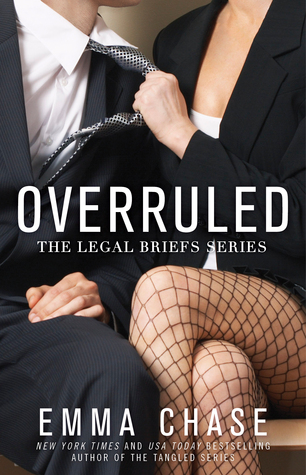 Overruled
Overruled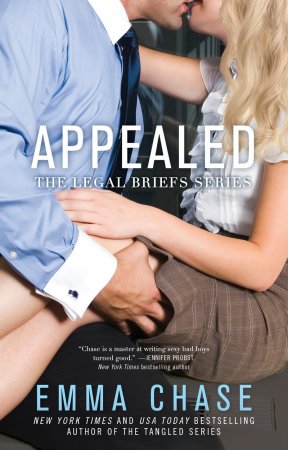 Appealed
Appealed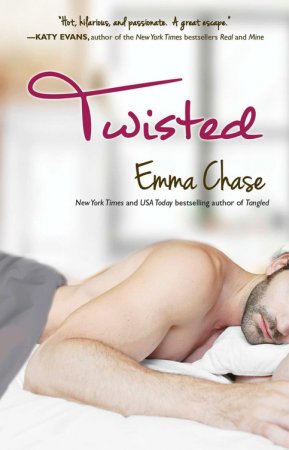 Twisted
Twisted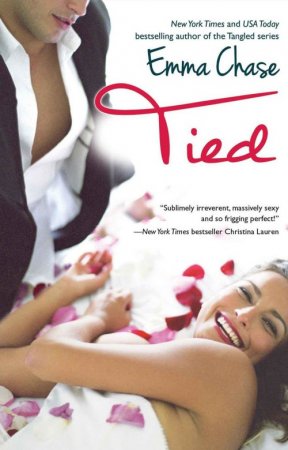 Tied
Tied Royally Screwed
Royally Screwed It's a Wonderful Tangled Christmas Carol
It's a Wonderful Tangled Christmas Carol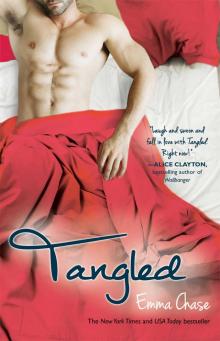 Tangled
Tangled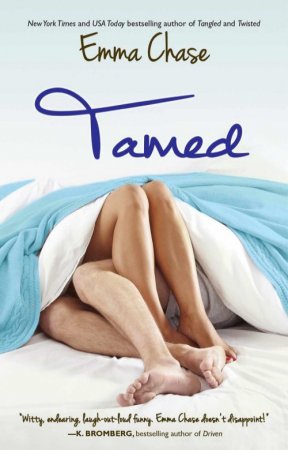 Tamed
Tamed Sidebarred
Sidebarred Sustained
Sustained Tangled Extra Scenes
Tangled Extra Scenes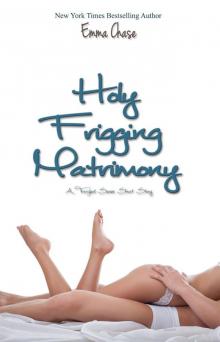 Holy Frigging Matrimony: A Tangled Series Short Story
Holy Frigging Matrimony: A Tangled Series Short Story Getting Schooled
Getting Schooled Royally Matched
Royally Matched Royally Endowed
Royally Endowed Royally Raised
Royally Raised Dirty Charmer
Dirty Charmer Getting Played (Getting Some Book 2)
Getting Played (Getting Some Book 2) Royally Yours
Royally Yours